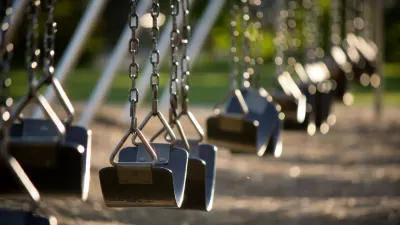Inequality
What Makes a Place Feel Safe?
Utilizing an online tool that compares images from Google Street View, researchers have built a better understanding of the 'small, often imperceptible reasons' that make some streets and places feel safer than others.
Why We'll Likely See a Lot More Urban-Oriented Protests in the Future
If there's one common thread uniting the recent protests in Brazil and Turkey, it's the growing inequality evident in cities, and the inability (or disinterest) of the public sector in bridging that gap through public services.
To Discern D.C.'s Haves and Have-Nots, Look to the Trees
In Washington D.C., double the amount of residents in affluent areas live among plentiful green spaces. Lessening the disparity will require the cooperation of private property owners, not all of whom see more trees as a good thing.
Inequality Finds a Home in the Suburbs
Through the lens of the Los Angeles region, Becky M. Nicolaides and Andrew Wiese examine how America's suburbs sustain and reinforce inequality.

The Prevalence of Play Deserts
A new study analyzing the amenities in 165 parks in the four-county Kansas City metro region found that low-income neighborhoods suffer from a lack of play spaces, despite having more parks per capita, reports Emily Badger.
Kotkin and Florida Duke it Out Over 'Limits' of the Creative Class
After a decade of debate, Richard Florida's theories on the 'creative class' have been championed by many, and challenged by others (perhaps none more forcefully than author Joel Kotkin). In recent articles, the two are battling it out once again.
NYC's Growing Inequality Reflected in its Parks
While parks adjacent to affluent areas of New York City, such as Central Park or the High Line, are benefiting from record levels of private contributions, open spaces in poorer communities are struggling to fund routine maintenance.
Chinese Economists Call for Fundamental Reforms to Fight Urban Income Gap
Following the Chinese government’s pledge to address its growing urban income gap, India’s The Economic Times suggest that current proposals do not go far enough.
Talent Clustering: A Wide or Narrow Benefit?
Experts have disagreed about the net effect of America's increasing clustering of highly skilled and affluent citizens in a relatively small number of metro areas. Richard Florida examines who benefits and who loses from this process.
Obama's Inaugural Address Cheered by Urbanists and Environmentalists
Matt Bevilacqua found much to cheer in the 'renewed focus on urbancentric topics' that President Obama delivered in his second inaugural address. Climate change, immigration, and inequality were among the speech's primary topics.
Will Hong Kong's 'Parking Space Bubble' Burst?
In Hong Kong, new government policies to curb real estate speculation in housing markets have led investors to turn elsewhere for quick, lucrative profits - the market for parking spaces.
Are Policymakers Failing 'The Truly Disadvantaged'
On the 25th anniversary of sociologist William Julius Wilson's seminal book on urban poverty, the effect of neighborhoods on people's lives is getting renewed attention in academia. But is anyone in power listening?
Less Plans on Paper, More Practical Thinking Needed for Mumbai
Every 20 years, the Municipal Corporation of Great Mumbai (MCGM) publishes a Development Plan. Kristen Teutonico argues that past and current plans have been too grand for implementation and that the City should focus more on smaller-scale projects.
Sandy Exposes New York's Increasing Inequality
Extreme events tend to expose the true weaknesses and strengths of a place and its people. In the same way that Sandy revealed the shortcomings in NY's physical infrastructure, it has shown the growing chasm in the city's economic infrastructure.
A Tale of Two Americas
Richard Florida warns about America's increasing “economic Balkanization”: a shrinking working class and the attendant swelling of low-wage service sector employees and the unemployed on the one hand, and the prosperous creative class on the other.
New York Fails to Document Parks Inequality
A law passed unanimously by New York's City Council just four years ago requiring the Department of Parks and Recreation to document "how much money was flowing into different parks across the city" is being neglected, reveals Jacob Hodes.
Gentrification and Ghettoization a Rising Crisis in Europe's Cities
Harvey Morris surveys recent controversies in France, England, and Germany that have stoked the simmering debate over whether the accelerating gentrification of Europe's major cities is leading to the ghettoization of their urban poor.
Is Crowdfunding Inherently Unfair?
Ethan Zuckerman pens a thought provoking piece on the potential downsides of crowdfunding public improvement projects. Is there a way to avoid the unequal and government-shrinking effects of funding public projects through private contribution?
What Income Inequality Looks Like From Space
Tim De Chant compares satellite images of neighborhoods from cities around the world to see if inequality is manifest in the patterns of the landscape. The differences are striking.
Last Stop: the Shredding of America's Transit Networks
Amidst the paradoxical increase in ridership demand, Yonah Freemark explores the plague of transit cuts reinforcing regional inequalities across the country.
Pagination
Urban Design for Planners 1: Software Tools
This six-course series explores essential urban design concepts using open source software and equips planners with the tools they need to participate fully in the urban design process.
Planning for Universal Design
Learn the tools for implementing Universal Design in planning regulations.
Caltrans
Smith Gee Studio
Institute for Housing and Urban Development Studies (IHS)
City of Grandview
Harvard GSD Executive Education
Toledo-Lucas County Plan Commissions
Salt Lake City
NYU Wagner Graduate School of Public Service


































